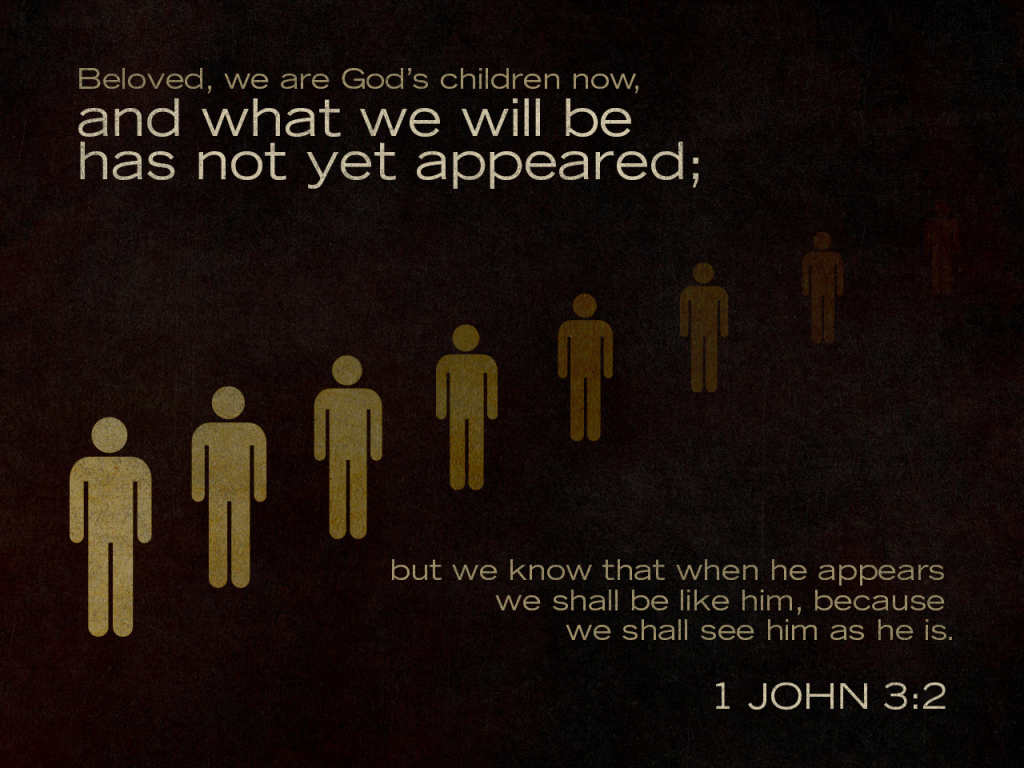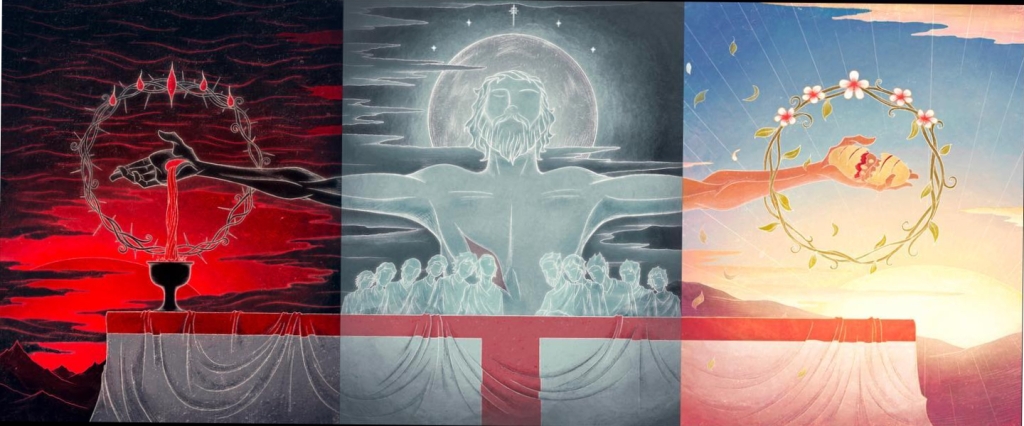
1 Peter 4:7–11
7 The end of all things is at hand; therefore be self-controlled and sober-minded for the sake of your prayers. 8 Above all, keep loving one another earnestly, since love covers a multitude of sins. 9 Show hospitality to one another without grumbling. 10 As each has received a gift, use it to serve one another, as good stewards of God’s varied grace: 11 whoever speaks, as one who speaks oracles of God; whoever serves, as one who serves by the strength that God supplies—in order that in everything God may be glorified through Jesus Christ. To him belong glory and dominion forever and ever. Amen.
Alleluia! Christ is risen!
He is risen indeed! Alleluia!
In the name of Jesus. Amen.
When something is coming to an end, there is often a sense of urgency. The last month of my senior year of high school, my class of twelve got together more often than we did the years prior. At Bible camps, kids will goof off at the campfire, but the last night they will share about their life, reflect more on what they have learned, and talk about how they hope to be different and better when they go back to their regular lives. When a family member is in their last days, every moment, every word, every interaction carries more weight to it. As the end draws near, little things become even more insignificant, and the big things become even bigger.
In this epistle reading, Peter says that the end of all things is at hand. Because Jesus has died, risen, and ascended into heaven, His work as the Savior of mankind is complete. Everything necessary for your salvation, redemption, and restoration has been accomplished. Now, your Savior and Brother sits on the throne of all creation. At any moment, Jesus can return and bring an end to all things. All of this is to say that we are living in the end times. Peter said this nearly 2,000 years ago, so it’s at least as true now as it was then. The end, the completion, the finishing of all things is at hand.
And that has a different ring to it than if Peter had written, “The end of all things is coming soon,” doesn’t it? “Soon” presupposes and anticipates a delay – even if it is only a short delay. But Peter doesn’t talk about Christ’s return as coming soon. It is “at hand.” That gives an extra ‘umph’ of urgency and immediacy. But the fact that the end of all things is “at hand” doesn’t excuse us to be worried and get frantic. Peter here doesn’t allow us to be the Christian version of Chicken Little running around and yelling, “The sky is falling; the sky is falling.” Not even close.
Instead, we are called to be self-controlled and sober-minded. In other words, we are to be in control of all our actions. Yes, of course, this refers to not getting drunk with alcohol. It includes that, but Peter means more than that. This call to be self-controlled and sober-minded is an echo of what Jesus says in Mt. 6:25-34, “Do not be anxious,” because when we are anxious, we do all sorts of ridiculous things. There is a myriad of awful, evil, horrible things going on in the world, but Jesus hasn’t given you permission to worry about it or run around all frantic and anxious.
The danger of anxiety and worry is that it would distract us from our prayers. It’s easy to fall into the trap of thinking that our worry will change what is going to happen. But more often worry distracts us from prayers. Take your worries and anxieties and turn them into prayers (1 Pet. 5:7). In a very real sense, worry is just a form spiritual drunkenness. Worry can distort the truth and the reality that Christ is in control of all things. To be self-controlled and sober-minded here is to let the fact that Jesus is ascended to the throne of all creation, that He has promised to hear your prayers, and that He promises to answer those prayers, let those truths keep you calm, clear-headed, and focused. Don’t get drunk with worry and the cares of this world. Be self-controlled and sober-minded because the end of all things is at hand.
Instead of being worried, Peter gives us three instructions of what we are to do as we live in the time of the end. We are to love, show hospitality, and use our God-given gifts. Each of these instructions could be its own sermon. But today, I want to focus on the first one because Peter says it is the most important of the three. He says, “Above all love one another,” and he tells us why we are to love one another, “because love covers a multitude of sins.”
Now, we have to be clear on a couple things here. First, Peter isn’t equating this love that covers a multitude of sins with forgiveness. Yes, forgiveness is a loving thing that releases sins. God’s love for us, which is manifested in Christ’s death, that love has forgiven and removed our sins from us as far as the east is from the west (Ps. 103:12). Other places in Scripture call us to love others by forgiving their sins, but Peter is doing something different here when he talks about covering a multitude of sins. We are to have a love that makes the sins of others invisible. We are to have a love that hides the sins of others.
That brings us to the second thing that needs to be clear. This does not mean that we don’t call sin what it is – sin. Sin is sin is sin. To say anything different is not loving. It isn’t loving to say that it’s ok for someone to be addicted to drugs because that is just the way God made them. That’s not love. Sin needs to be brought to the surface so it can be repented, confessed, and forgiven. So, what does it mean that love covers a multitude of sins?
It means that when others sin against us – especially our brothers and sisters in Christ – we are called to love them in such a way that overlooks, ignores, buries, and covers those sins. Holding grudges just isn’t worth it. The 8th Commandment and its explanation in the Small Catechism is especially helpful here: “Thou shalt not bear false witness against thy neighbor.” What does this mean? “We should fear and love God so that we do not deceitfully lie about, betray, backbite, nor slander our neighbor, but defend him, speak well of him, and put the most charitable construction on all that he does.”
It is extremely easy for us to put the least charitable construction on the actions of people who sin against us. Someone cuts you off in traffic or budges in front of you, and you assume, “That guy is an idiot,” or, “She’s rude and inconsiderate.” But you know what is just as easy? Maybe it’s slightly more difficult because of our pride – it’s just as easy to put the most charitable construction on their actions. “That person just made a mistake. Maybe, they have something going on in their life that I don’t know about.” The danger for us is that when we are always ascribing the worst motives to others, it’s easy to assume and imagine that they do the same to us. That is a dangerous place to be.
Of course, when someone sins against you and you point it out, that person should repent and ask for forgiveness. That’s how things should work. But what happens when you point out someone’s sin and they say, “I didn’t do anything wrong,” and they don’t ask for forgiveness? What do you do then? Is the relationship over? No. It shouldn’t be. That is where this passage comes in. “Love covers a multitude of sins.” And this is what we are to keep doing. Keep loving one another earnestly and fervently because love covers a multitudeof sins.
This covering up of sin through love is a distinct virtue of Christians that does not exist in the world. But the world will notice when you do this, Christian. They will see it and be drawn to it. This kind of love for one another isn’t always going to be pleasant for you. But it will be attractive to those who aren’t Christians. Having this kind of love that covers sin might be the most important evangelistic work that you do. Repeatedly in the book of Acts, this kind of love between Christians is what attracted others to see what was different about believers. So keep loving one another earnestly, since that love covers a multitude of sins.
Now, I know that was a lot of law. I recognize that. I’ll just point out that this text is full of law, so that’s what I have to preach. But I will close with this: your heavenly Father hasn’t only covered your sin and pretended that it isn’t there. No. Because of Jesus, He has removed it, forgiven it, trampled it under His foot, and cast it into the depths of the sea (Mic. 7:19). Because of that – because your sins are gone, taken away, and forgiven – you can more easily cover the sins of others in Christian love. Amen.
Alleluia! Christ is risen!
He is risen indeed! Alleluia!
The peace of God, which surpasses all understanding, will guard your hearts and minds in Christ Jesus. Amen.









You must be logged in to post a comment.